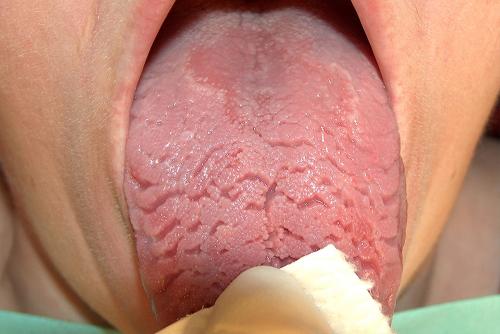3. Cracked or fissured tongue

Visible cracks and deep grooves on the tongue could be a harmless condition called fissured tongue. However, it’s sometimes associated with conditions like psoriasis or dehydration.
What to do:
- Keep your mouth well hydrated
- Maintain good oral hygiene to avoid food debris getting stuck in the grooves
- Avoid spicy, salty, or acidic foods that can cause discomfort
- If the cracks become painful, consult a dentist
4. Smooth, pale tongue
A tongue that appears unusually smooth and pale might be a sign of iron-deficiency anemia or a lack of folic acid and vitamin B12. These deficiencies can reduce oxygen supply in the blood and affect overall energy levels.
What to do:
- Add iron-rich foods like spinach, red meat, lentils, and pumpkin seeds to your meals
- Eat foods high in vitamin B12, such as eggs, dairy, and fortified cereals
- A blood test can confirm deficiencies, and supplements may be needed under medical guidance
Final tip:
Your tongue is like a window into your internal health. If you notice persistent changes, it’s best to seek medical advice. Don’t ignore what your mouth is trying to tell you.
3. Cracked or fissured tongue

Visible cracks and deep grooves on the tongue could be a harmless condition called fissured tongue. However, it’s sometimes associated with conditions like psoriasis or dehydration.
What to do:
- Keep your mouth well hydrated
- Maintain good oral hygiene to avoid food debris getting stuck in the grooves
- Avoid spicy, salty, or acidic foods that can cause discomfort
- If the cracks become painful, consult a dentist
4. Smooth, pale tongue
A tongue that appears unusually smooth and pale might be a sign of iron-deficiency anemia or a lack of folic acid and vitamin B12. These deficiencies can reduce oxygen supply in the blood and affect overall energy levels.
What to do:
- Add iron-rich foods like spinach, red meat, lentils, and pumpkin seeds to your meals
- Eat foods high in vitamin B12, such as eggs, dairy, and fortified cereals
- A blood test can confirm deficiencies, and supplements may be needed under medical guidance
Final tip:
Your tongue is like a window into your internal health. If you notice persistent changes, it’s best to seek medical advice. Don’t ignore what your mouth is trying to tell you.

